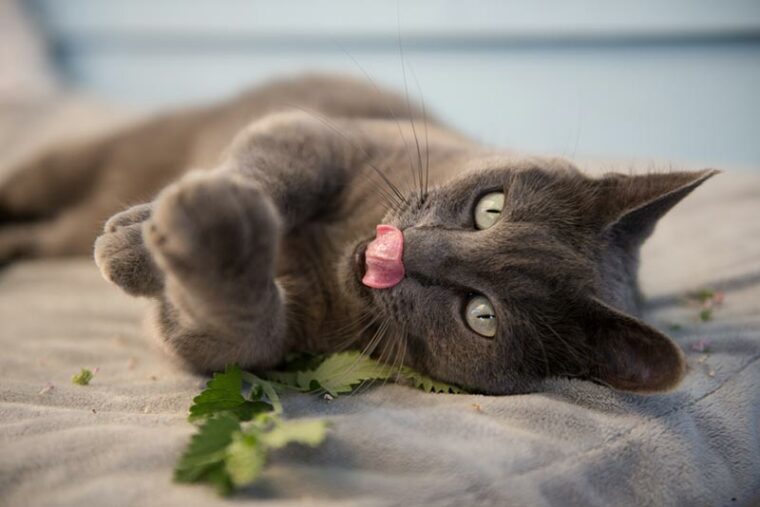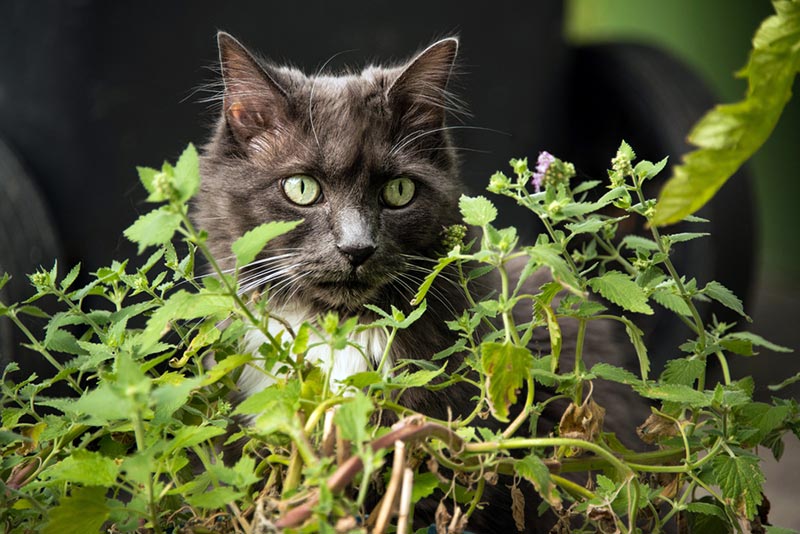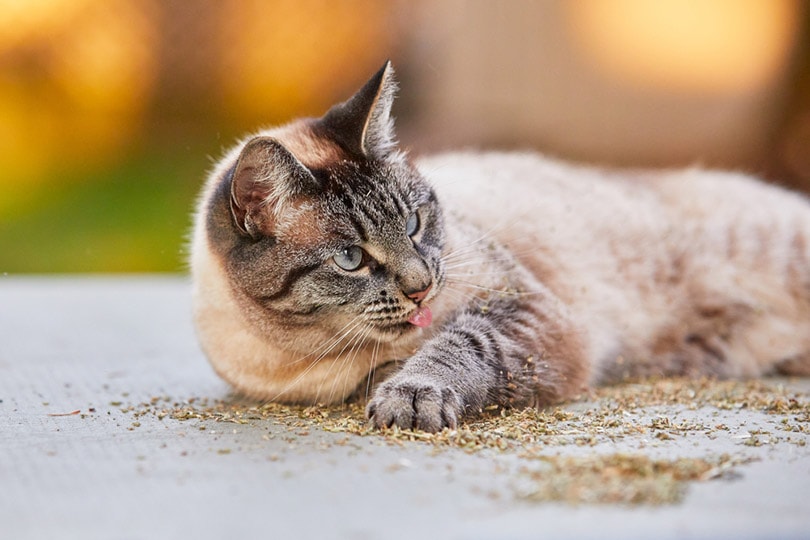
While catnip is often jokingly considered a “drug” for cats, it doesn’t work precisely the same as human drugs. Catnip contains an oil called nepetalactone, which has a similar chemical composition to an ordinary cat pheromone (that encourages mating behavior). Therefore, when cats sniff catnip, their nervous system is stimulated. Nectapenolone can bind to specific receptors, creating and euphoric or pleasurable effect on the cat.
However, this chemical isn’t mainly related to drugs and isn’t addictive. Cats are biologically attuned to catnip for one reason or another. Scientists have discovered that only about 50-70% of cats are susceptible to catnip effects since it seems to be related to a recessive gene. Some cats simply do not respond to catnip. Likewise, kittens, are unable to respond to catnip since their brain receptors have not matured.
Catnip produces different effects depending on the cat. However, most cats become “immune” to catnip after 10–15 minutes. After this period, cats will be immune to the effects for anywhere from 30 minutes to 2-3 hours. Therefore, even if catnip were drug-like, it would be highly unlikely for a cat to get addicted to catnip, considering how short of a time the effects last. So no, cats cannot become addicted to catnip in the same way that humans can become addicted to drugs
Is It OK to Give a Cat Catnip Every Day?
It is okay to give cats catnip every day. However, it is important to remember that cats become immune to the effects of catnip shortly after they are exposed to it. This immunity may last 30 minutes in some sensitive cats, or it can last as long as 2-3 hours. Therefore, offering it more often may result in plenty of wasted catnip.
Furthermore, we only recommend treating one toy or surface with catnip each time. While you may think you’re providing extra fun by spreading catnip around the house, your cat is only going to react to the first catnip-covered area they come across. Therefore, having two catnip toys at the same time isn’t very useful.
The only exception to this is if you have two cats. They may prefer not to share their catnip, so spreading it out may be the best option.

Can Cats Get Dependent on Catnip?
Cats cannot get dependent on catnip. While cats may appear to become “high” when on catnip, this isn’t really what’s happening. Instead, catnip resembles pheromones—not drugs. Therefore, catnip smells really good and stimulates pleasure centers, which causes cats to exhibit the behaviors we’ve all witnessed.
Therefore, cats cannot become physically dependent on catnip. They won’t withdraw from it or experience negative symptoms after the catnip wears off.
However, cats could theoretically become mentally dependent on catnip if you give it to them regularly for an extended period. It may become part of their routine, in other words. If that routine is changed, cats may become upset or anxious. However, this could be said about nearly anything—not just catnip. Cats don’t like changes in their routine, in general.
Catnip can really enrich your cat's life, especially if you choose a fun, well-built catnip toy. Our favorite option is Hepper's Catnip Stick Toy, which offers sturdy construction, 100% organic catnip fill, and a great range of colors. These toys are handmade in the USA and feature bite-proof double bagging.
At Pet Keen, we've admired Hepper for many years, and decided to take a controlling ownership interest so that we could benefit from the outstanding designs of this cool cat company!
Does Catnip Affect Cats Long-Term?
Catnip doesn’t have a long-term effect on cats in most cases. Cats may become more tolerant of catnip when given it regularly. They may also come to expect it, which may cause them to meow and “ask” for it. However, this is similar to what cats often do for treats, food, water, toys, and attention. Therefore, it is simply due to them liking the catnip—not because of a dependency on catnip.
Beyond that, long-term effects have not been studied in depth. One study did look at catnip exposure in mice. This study found that mice fed catnip for an extended period tended to sleep more than the control group. These mice were also more susceptible to seizures that were induced, as well. (However, induced is the keyword here. The mice didn’t start having seizures after exposure to catnip; it just took fewer toxins for them to start having seizures.)
Therefore, catnip may make your cat sleep more than it might usually, as it relaxes them. In the long run, this may lead to obesity or similar issues. However, assuming you aren’t measuring your cat’s food or encouraging them to move, this shouldn’t be an issue.
On the other hand, cats that regularly use catnip may be less high-strung than those that do not. However, this has not been studied profusely.

Can Cats Overdo It on Catnip?
Technically, cats can overdo it on catnip. However, because catnip’s effects end quickly after exposure to it, this isn’t very common. Furthermore, once your cat is exposed to catnip, it will become immune to it for some time, so cats can’t keep using it. More catnip after their exposure period doesn’t do anything.
However, cats can become ill from overeating catnip. However, this isn’t necessarily because of the oil in the catnip that causes their symptoms. Instead, their stomachs may just become upset as when they overeat any plant.
You shouldn’t force your cat to eat catnip, especially since the effects wear off quickly. If your cat shows any signs of stomach upset after consuming catnip, consider lowering the amount or providing it in a way that prevents them from eating it (such as putting it inside a toy).
Conclusion
Cats cannot become addicted to catnip in the same way that humans can become addicted to drugs. Catnip isn’t a drug at all. Instead, it mirrors a pheromone in felines, prompting our cats’ strange behaviors. Therefore, cats cannot become chemically dependent since it doesn’t act like a drug.
However, it is possible that cats could become used to it if it becomes part of their routine. Cats are particular about their routine and like things to remain the same. Therefore, if they’re used to getting catnip and you suddenly don’t provide it, they may meow and until they get it.
With that said, this is more about your feline’s routine than the actual catnip.
Featured Image Credit: Anna Hoychuk, Shutterstock







